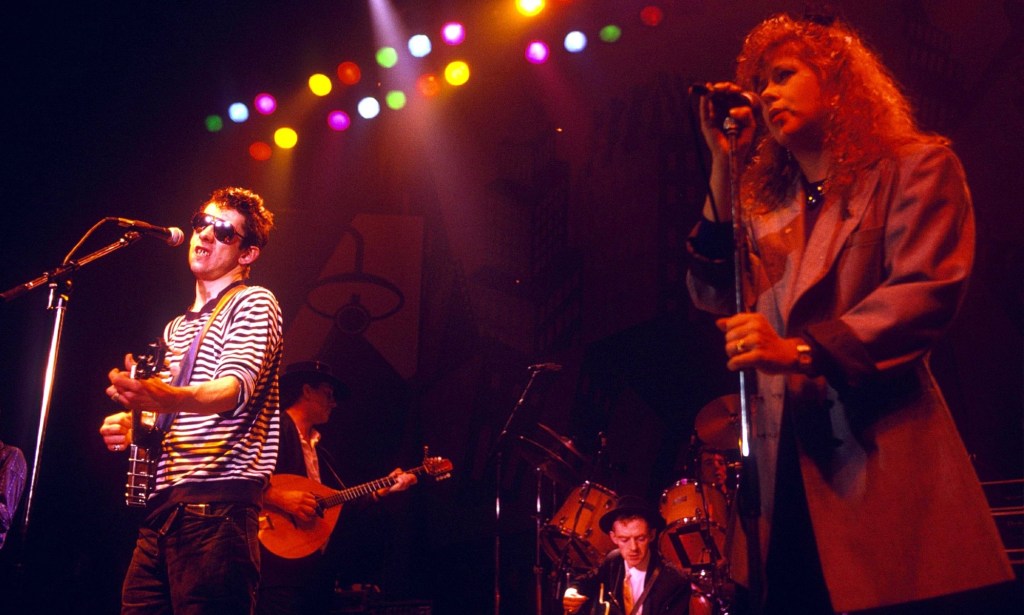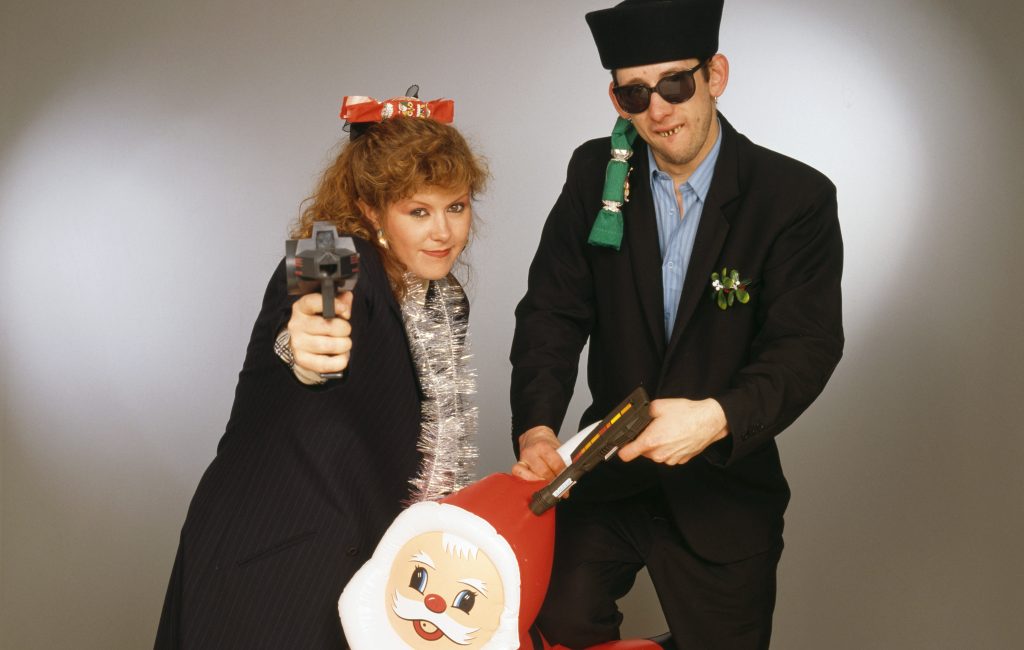How Shane MacGowan’s views on Fairytale of New York’s homophobic lyrics changed

It’s that time of year again. (YouTube)
It’s that time of year again – no, we’re not talking about filling our homes with gaudy Christmas decorations and watching endless reruns of Nigella’s Christmas cookery shows and every version of A Christmas Carol ever made.
What we are talking about is the “Fairytale of New York” homophobia discourse, which this year coincides with the death of The Pogues lead singer Shane MacGowan at the age of 65.
People say Christmas is the most wonderful time of the year, but for queer people, the slow march towards December has come to represent a return to a tired, exhausting debate about homophobic slurs, “woke” politics and cancel culture.
In case you’ve spent the past few Christmases sleeping under a rock, here’s the main thrust: in 1987, English-Irish punk band The Pogues released an “anti-Christmas” song called “Fairytale of New York”. The Christmas music market of the day was all about cloying festive cheer – think Wham!’s “Last Christmas” or Chris Rea’s “Driving Home for Christmas” – which immediately set the new song apart as something different, and perhaps even necessary.
With “Fairytale of New York”, The Pogues tapped into something nobody knew they wanted or needed: Christmas misery.
The song is a sorry story about an Irish immigrant as he reflects on Christmases of yesteryear with a former lover while he slowly sobers up in a New York drunk tank. It’s a furious track about a toxic relationship that went wrong, with an impassioned Kirsty MacColl delivering one of her best vocal performances.
It’s a brilliant song, and it’s not difficult to see why it has such broad appeal. In a season of compulsory happiness, we need songs that represent the harsh realities of Christmas too, and “Fairytale of New York” delivers that in spades.
Unfortunately, there’s one particular line in the lyrics that’s sure to pull any queer person immediately out of their festive reverie. “You scumbag, you maggot/You cheap lousy f****t/Happy Christmas, your arse/I pray God it’s our last,” MacColl sings on the original version.
Kirsty MacColl first cut the ‘f slur’ from the song in 1992
Let’s get one thing straight: that lyric was hurtful to queer people when the song was first released and it’s still hurtful more than 35 years later. The f-word is a slur that too many queer people will have been taunted with by homophobic bullies. Memories abound of it being shouted on school playgrounds, or of it being brandished like a weapon of mass destruction on social media.
It’s a cruel word that will make most queer people immediately sit up and take stock of their surroundings.
To cut The Pogues and MacColl some slack, they probably never thought the song would become what it is today. The song, written by Pogues banjo player Jem Finer and frontman Shane MacGowan, is about the pain and suffering of an Irish immigrant – it clearly wasn’t written with the expectation that it would find itself on a heavy radio rotation every December for the rest of time.

And yet, here we are: in the UK and Ireland, “Fairytale of New York” remains an eternally popular Christmas song. It’s taken on a life of its own, and has been largely stripped of the meaning intended. Nowadays, it’s mostly blared out in pubs where straight people will gleefully scream the f-slur at their friends.
So, as we gear up for the annual “Fairytale of New York” discourse to kick off again, let’s take stock of the facts and try to separate the controversy from the “woke” narrative that’s been pushed by an increasingly hostile right-wing press.
The first – and most important – thing to note is that MacColl, The Pogues and even broadcasters have exhibited some level of discomfort with the original lyric as far back as the early 90s – so no, the debate has nothing to do with queer people being “too sensitive”.
In 1992, during a performance on Top of the Pops, MacColl changed the words to: “You’re cheap and you’re haggard”.
The BBC and other broadcasters even censored words like “f****t” and “slut” in the late 80s and early 90s, suggesting that they too were a little uncomfortable with misogynistic and homophobic slurs populating a Christmas song.
For a long time, queer people simply seemed to accept that the slur was a part of the song. We all got on with life – and Christmas – and many of us even grew to love the song.
Then, in 2017, the song had something of a resurgence. After years of peaking in the top 20 each festive season, the song reached number five in the UK charts at Christmas. With that came endless debate on what to do with a song that includes such a brutal homophobic slur.
Queer people aren’t a monolith, and there will be different opinions in the mix, but on social media the conversation has mostly focused on whether the word should be censored when played on the radio. Simply put, removing the word is actually pretty easy – stations can play the updated “haggard” version sung or they can simply edit out the word in the same way they would with words like “f**k”.

And yet, the pushback against any form of censorship has been immense. Opinion pieces in the right-wing press have stacked up with each passing year, with overpaid heterosexual columnists decrying what they lament as cancel culture and defending The Pogues’ right to free speech.
The Pogues accept that ‘Fairytale of New York’s homophobic lyric should be censored
But here’s the problem with that argument: even The Pogues accept that there’s something wrong when we have large numbers of straight people fighting to keep a homophobic slur on the radio over the Christmas season.
MacGowan, who wrote the song, had previously explained that the lyric had never meant “offend”, but he did not think it should be censored when played on the radio.
“The word was used by [Kirsty MacColl’s] character because it fitted with the way she would speak and with her character,” MacGowan said in 2018.
“She is not supposed to be a nice person, or even a wholesome person. She is a woman of a certain generation at a certain time in history and she is down on her luck and desperate.”
He added: “Her dialogue is as accurate as I could make it but she is not intended to offend! She is just supposed to be an authentic character and not all characters in songs and stories are angels or even decent and respectable, sometimes characters in songs and stories have to be evil or nasty in order to tell the story effectively.”
Two years later, MacGowan’s former bandmates seemed to express some level of discomfort with the song when they retweeted a post from X (formerly Twitter) user Harrison Brocklehurst which said: “This is all I’m gonna say on it for the whole year: the word itself being in ‘Fairytale of New York’ doesn’t bother or offend me, but straight people being so angry and outraged at its removal and fighting and arguing for the right to sing it bothers me deeply.”
The band also shared another post the same day which drew attention to the fact that the public is getting bogged down in debate about a song when real-life government policies were (and still are) actively harming LGBTQ+ youth.
The Pogues’ remaining members seemingly agree that there’s an issue with straight people singing the f slur in their song. MacColl, who died after being struck by a powerboat in the sea off the coast of Mexico in 2000, also apparently felt the word should be censored.
Queer people mostly seem to want the word stripped from radio airplay and in public spaces. So, why are so many straight people still so attached to it, to the extent where it even appears prominently in mainstream Christmas specials such as Gavin & Stacey?
Whatever the answer, whether it’s down to widespread homophobia or just ignorance, one thing is obvious: you wouldn’t call a queer person a f****t on their birthday, so why would you do so at Christmas?

